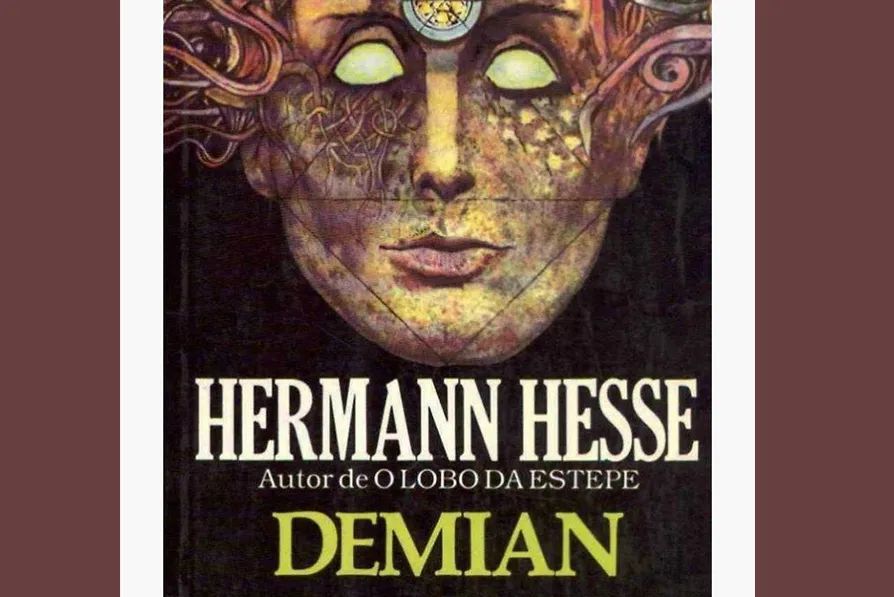
Book cover source
In Hesse’s Demian, I’m introduced to a theological approach entirely alien to me hitherto. It’s not a novelty, on the contrary, quite ancient, primordial. To understand how it is, we must understand the features of the popular one. In Abrahamic religions, God is light. He's great, merciful, beautiful, and is the ultimate guardian for every living soul. Whatever is true and just, he has a claim to it. Anything bleak, dark, evil - he doesn’t want anything to do with it. But our whole world is not made of good stuff only. Generally, there are two aspects of everything. Good and bad. Yin and yang. Abrahamic God will embody only one side of that, everything that is good. All that is evil is left for other entities.
Questioning God’s motivation, in this case, can lead to disbelief. But the theology Hesse’s Demian proposes ain’t devoid of belief. Far from it. It’s actually more intimate and personal in nature. A belief that leans toward realistic spiritualism. The deity of this belief is Abraxax, a god that embraces both good and evil. He’s both God and Satan entwined in a single entity. A unison of two contrary forces. Hence, a god that is superior to the Abrahamic god.
This is not a story that is out to convert others. I have no religious affiliation and I took this as part of my study of philosophy.
'Demian’ is most certainly a story of adolescence, make no mistake about that. It tells the coming-of-age story of Emil Sinclair (which is a pseudonym of Hesse), one of the protagonists. Another main character is his schoolmate, Demian, a slightly older, charismatic young boy Sinclair comes to know about in Latin class. Demian is quite manly considering his age, has a mysterious air about him, and seems to be firm on the ground he stands. Lots of tell-tale gossip sprouts around him on a regular basis.
One of their classes had the biblical story of Cain and Abel quite frequently. One day Sinclair comes to know of an explanation of the story from Demian, a slightly different version of it than you’d expect.
Perhaps Cain was someone out of the ordinary. Intelligent, nothing like the common folk. So they started to fear him, as that is what humans do when they don’t understand something or someone. They started to spread rumors about him. Cain and his children all had marks on their forehead, not any physical mark, rather the vibe of wisdom, transcendency. Unseen to the naked eye.
Young Sinclair grew up in an uptight, devout Christian family. So he doesn’t take to Demian’s explanation right away. However, he was old enough to notice the eternal battle between good and evil all around him. One might raise the question here, can a boy in his adolescence attain that wisdom to tell apart good and evil objectively? Perhaps, yes. According to Hesse, the story is not entirely fiction in nature, neither are the characters. It’s his own tale. So he didn’t create a whole another persona and possessed it, presuming to know everything about it, like how writers usually do it in fiction.
Sinclair of the story grows up, and almost inevitably he succumbs to the evil of our civilization. The story then proceeds to reenact his further encounters with Demian in different stages of his life. Sinclair progressively finds himself leaning more and more to the unified god Abraxas.
Hesse did something with the writing style. Apart from rich prose, he experimented with story progression and gradually changed how complex that prose was relating to the age of the protagonist. His imagery at the beginning of the novel when Sinclair was young is quite distinct to how it is in the end when he is much older. The sentences gradually became more and more rigid, compound, and flowery.
"By a very devious route, I sneaked through the little alleys of a changed town, under a cloudy sky such as I had never seen before."
Easier expression with small clauses like this one turned into the likes of these at one point -
"I stood braced against a poplar tree staring into the drifting clouds whose mysteriously writhing patches of light soon metamorphosed into huge series of swirling images."
Also as Sinclair grew up, complimenting his new belief, new experience, he increasingly used uncommon diction. A reader can feel this subtle change of Sinclair without breaking a sweat.
I loved reading Demian. It’s hard to express my personal thoughts about it and keep this review impersonal and I think this is a book that should be read first and discussed later among the readers. Otherwise, no amount of words can truly be a substitute.
Thanks for stopping by as always. :)

About Me


Twitter - https://twitter.com/not_a_c1nephile
Youtube - https://www.youtube.com/channel/UCg3TwYk--HKIsRmnvhob1Mg